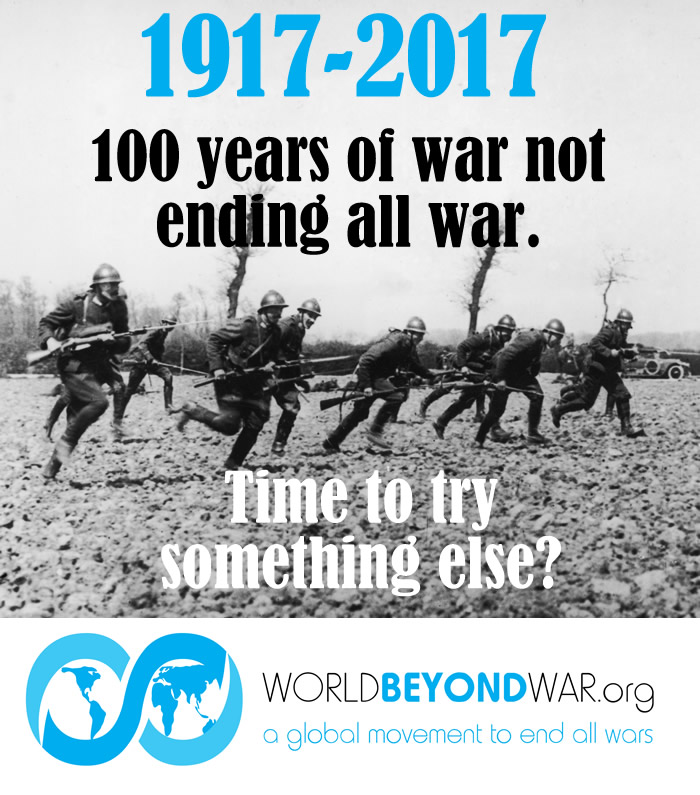General Discussion
Related: Editorials & Other Articles, Issue Forums, Alliance Forums, Region Forums100 Years of Using War to Try to End All War
By David Swanson
Global Research, February 25, 2017
World Beyond War 24 February 2017

This April 4th will be 100 years since the U.S. Senate voted to declare war on Germany and 50 since Martin Luther King Jr. spoke out against the war on Vietnam (49 since he was killed on that speech’s first anniversary). Events are being planned to help us try to finally learn some lessons, to move beyond, not just Vietnam, but war.
That declaration of war on Germany was not for the war that makes up the single most common theme of U.S. entertainment and history. It was for the war that came before that one. This was the Great War, the war to end all wars, the war without which the conditions for the next war would not have existed.
As well recounted in Michael Kazin’s War Against War: The American Fight for Peace 1914-1918, a major peace movement had the support of a great deal of the United States. When the war finally ended (after the U.S. had actually been in it for about 5% the length of the war on Afghanistan thus far) just about everybody regretted it. The losses in life, limb, sanity, property, civil liberties, democracy, and health were incredible. Death, devastation, a flu epidemic, prohibition, a permanent military and the taxes to go with it, plus predictions of World War II: these were the results, and a lot of people remembered that they had been warned, as well as that the ending of all war had been promised.
The peace activists had warned the U.S. government to stay out of the war (not out of foreign relations, just out of mass-murdering foreign relations). And they had been right. The regret was intense and lasting. It lasted right up until the worst result of World War I came along in the form of World War II. At that point, regret was replaced with forgetting. World War I was erased from popular history, and its child on steroids was celebrated rather than mourned, and has been celebrated with growing reverence ever since.
http://www.globalresearch.ca/100-years-of-using-war-to-try-to-end-all-war/5576716
http://worldbeyondwar.org/
Jim__
(14,076 posts)An excerpt from The_Fourteen_Points:
II. Absolute freedom of navigation upon the seas, outside territorial waters, alike in peace and in war, except as the seas may be closed in whole or in part by international action for the enforcement of international covenants.
III. The removal, so far as possible, of all economic barriers and the establishment of an equality of trade conditions among all the nations consenting to the peace and associating themselves for its maintenance.
IV. Adequate guarantees given and taken that national armaments will be reduced to the lowest point consistent with domestic safety.
…
Points 6 through 13 are mostly about territorial issues having to do with World War I.
The US rejected Wilson’s League of Nations, and the Allies levied huge costs against Germany, largely over Wilson’s objections. Would Wilson’s ideas have made a difference had they been adopted? I’m not sure if the World Beyond War events will address these issues, but they should. Calling for an end to war is a nice idea. One way we may realistically approach such an end is to discuss why such efforts have failed in the past.